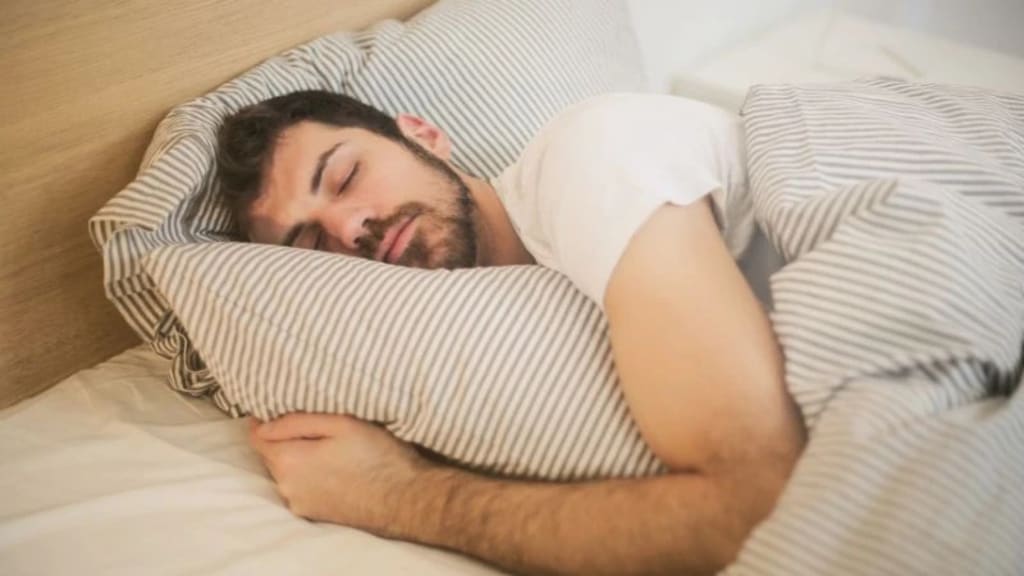The Importance of Sleep
Why sleeping 7-9 hours is so important

This story was first published on Attackonfatloss.com
The Importance of Sleep
We all know sleep is essential. Getting enough sleep has a noticeable impact on our daily lives.
The amount of sleep we get can affect our focus, productivity, and ability to remember things throughout our day.
But did you know that sleep also significantly affects your ability to lose weight, fitness goals, and mental health?
Experts recommend that adults sleep between 7 and 9 hours per night.
It is crucial to our ability to function; still, many of us struggle or neglect to get as much sleep as we should.
In fact, according to the National Institutes of Health, more than 40 million Americans suffer from chronic, long-term sleep disorders. Another 20 million occasionally have trouble falling asleep.
This is not surprising as most of us neglect our bodies’ natural sleep rhythm. We tend to see this a lot with the rise of “Hustle culture.” The notion that we have to devote all of our time to work or the “Hustle.” The more you work, the more celebrated you are.
This “hustle mentality” not only can cause you to lose sleep, but that loss of sleep can affect weight loss, performance, and mental health.
When my wife and I started our business, that was where my mindset was.
Quotes like “I’ll sleep when I die” or “I’ll sleep when it’s done” pushed me into believing that nothing was more important than work.
Busyness took priority over everything else, including my sleep.
A 2014 CDC report shows that of those who slept less than 7 hours per night:
33% of them were obese
27.2% were inactive
22.9% suffered from depression
I’m a personal trainer who lives with depression, anxiety, and chronic insomnia. So I have experienced first-hand what lack of sleep can do to us.
How Chronic Sleep Deprivation Affects Weight Loss
If fat loss is a healthy goal for you, getting enough sleep could be the key to helping you stick to a calorie deficit.
Research shows that when we don’t get enough sleep, the body will produce more Ghrelin, the hunger-inducing hormone, while lowering the production of the satiety hormone, Leptin. This combination can make us feel hungrier and increase our calorie consumption.
Researchers have also found that those who sleep as little as 5 hours per night eat between 300 and 400 calories more than those who have a good night’s sleep.
Let’s say you buckle down, summon all of your willpower, and don’t eat any extra calories.
That doesn’t fare any better.
Nedltcheva et al. found that despite eating the same amount of calories and losing the same amount of weight, participants who slept for 8.5 hours lost 2.33 times more fat than those who slept for 5.5 hours a night.
The 5.5 hours group also lost 1.6 times more lean body mass than the 8.5 hours group.
Wanting to lose weight and not getting enough sleep is like running a marathon in dress shoes. Yes, you might run for one or two miles, but it will take you much longer to cross the finish line, or worse, you might get frustrated and quit.
Check out our article on the rules of fat loss to learn what to prioritize and what you should ignore when trying to lose weight.
How Chronic Sleep Deprivation Affects Performance
If weight loss isn’t your goal, and all you care about is kicking butt in the gym or on the field, then improving the quality of your sleep is a MUST. When it comes to performance, you always want to be at your best to perform your best. Not getting a good night’s rest affects our ability to pay attention and make decisions, giving our opponents an advantage.
Other ways sleep deprivation affects performance are:
Risk of getting injured.
Hurt performance on compound movements (i.e., squats, deadlifts).
Reduction in muscle glycogen decreased performance and increased fatigue perception.
It affects strength, running performance, endurance, sprint time in runners, peak force, reaction time, and energy levels.
You cannot become the fastest racecar if your engine isn’t tuned correctly.
How Chronic Sleep Deprivation Affects Mental Health
The Anxiety & Depression Association of America states that stress and anxiety can cause people to develop sleeping problems and worsen them for those who already have them.
A 2018 study found that chronic sleep deprivation increases the risk of depression in young women. As well as a link between suicide attempts and adolescents who sleep fewer than 8 hours a night.
The National Sleep Foundation reported that 43% of people between 13 and 64 years old had insomnia due to stress at least once in the past month.
The state of our mental health can affect our weight loss and fitness journeys. Many of us turn to physical activity as it can positively impact our mental health. However, it can also have the opposite effect. For example, chronic stress can cause us to skip the gym and lead us to overeat.
It’s a constant cycle, which can be extremely overwhelming.
Here are ten tips to help you improve your sleep quality: (1)
Do not go to bed until you are tired. If you can’t fall asleep within 15 minutes, get out of bed and do something else until you become tired.
Create a routine before bed, like taking a warm bath or reading a book.
Use the bed only to sleep.
Do not use your phone while in bed. These screens emit blue light, which can trick your brain into thinking it is still daytime. If you must use your phone, like to read a book, some apps filter those blue lights. I recommend using “Twilight” for android phones, and the iPhone has a “night shift” feature.
Try to wake up every day at the same time, including weekends.
Do not smoke.
Avoid caffeine after lunch (HA! yeah, right, lol)- but really, it can help!
Try to avoid naps. If you must nap, limit them to 1 hour, and try taking them before 3 pm. A recent study examined the effects of different nap durations on performance, mood, muscle soreness, tiredness, stress, attention, and sleep quality. Although mood and fatigue did not significantly improve after napping, researchers found that longer duration naps did enhance performance and focus when napping for 35 to 45 minutes.
Your bedroom should be quiet, as dark as possible, and on the cool side (~68℉).
Avoid alcohol before bedtime.
The Bottom Line
To reach our fitness and weight loss goals, we should prioritize sleep as much as diet and exercise.
Research shows that improving sleep helps with symptoms of anxiety, stress, and depression while enhancing our quality of life. However, remember that when it comes to mental health, the first step should always be to talk to a professional.
Try some of these tips and see how they work for you. Who knows, this could be the missing link you have been searching for.
If you live with chronic stress, anxiety, depression, or have any thoughts of suicide, please talk to a professional or reach out to:
The Anxiety and Depression Association of America has great resources to help you find the help you need.
Call the National Suicide Prevention Lifeline at 1–800–273–8255. They are available 24 hours a day, seven days a week, and it’s 100% confidential.
About the Creator
Delwin Marrero
I'm just a personal trainer pretending to be a good writer.
I started writing in April 2022 due to my newfound love for Dungeons & Dragons.
Inspiring me to transport myself into fantastic worlds and incredible stories.






Comments
There are no comments for this story
Be the first to respond and start the conversation.